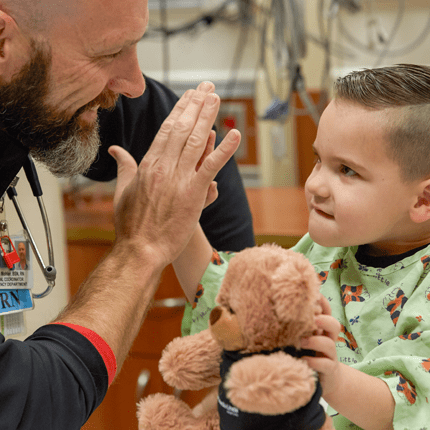John’s Story
Jul 24, 2020Neurosurgical Procedure is a Life Changer for Oxford Boy with Cerebral Palsy
 Amy of Oxford, Michigan welcomed her twin boys in 2012 at 26 weeks into her pregnancy. As the boys grew, Amy, who is a nurse, was concerned that her son John was not meeting developmental milestones at the same time as his fraternal brother.
Amy of Oxford, Michigan welcomed her twin boys in 2012 at 26 weeks into her pregnancy. As the boys grew, Amy, who is a nurse, was concerned that her son John was not meeting developmental milestones at the same time as his fraternal brother.
“He couldn’t sit up without assistance and wasn’t able to stand or pull himself up until much later than his brother,” she says.
At about 18 months of age, Amy’s local pediatrician suggested John be evaluated by Charles Pelshaw, MD, physical medicine and rehabilitation specialist at Children’s Hospital of Michigan.
Dr. Pelshaw diagnosed John with cerebral palsy.
“At this point, I was more relieved than worried since we finally knew what was causing John’s delayed milestones, Amy says.
Cerebral Palsy (CP) is a group of disorders that affect a person's ability to move and maintain balance and posture. According to the Centers for Disease Control and Prevention, CP is the most common motor disability in childhood.
 John received physical therapy several times a week to help with spasticity with dystonia (increased muscle stiffness and spasms). He also received Botox treatments initially every 6 months and then more frequently to about every 3 months to provide relief from spasticity symptoms including pain and muscle stiffness.
John received physical therapy several times a week to help with spasticity with dystonia (increased muscle stiffness and spasms). He also received Botox treatments initially every 6 months and then more frequently to about every 3 months to provide relief from spasticity symptoms including pain and muscle stiffness.
Although the treatments were helping, Amy was hoping for a more permanent solution to ease his condition.
Dr. Pelshaw recommended that John be evaluated for a surgical procedure called selective dorsal rhizotomy (SDR) performed by neurosurgeons at Children’s Hospital of Michigan. During the surgical procedure the nerves that lead to too much muscle tone, which is a condition of cerebral palsy and spasticity, are cut and can provide long-term improvement in muscle tone.
“John had difficulty with walking. At his age, it was an optimal time to look at SDR- given his great potential to walk independently,” Dr. Pelshaw says.
John was evaluated for selective dorsal rhizotomy by Neena Marupudi, MD, pediatric neurosurgeon at Children’s Hospital of Michigan and at the age of 6, he had the surgical procedure.
“Selective dorsal rhizotomy is a procedure that reduces leg spasticity and can help children with cerebral palsy walk independently. We performed John’s selective dorsal rhizotomy in a minimally-invasive fashion, through a small, 3 cm incision in the middle of his back. We monitor each and every nerve rootlet and selectively cut a portion of the sensory rootlets involved in causing abnormal hypertonicity. The procedure loosened John’s legs so he could learn to walk with improved motor function and endurance,” she says.
The difference is night and day in terms of how John has benefitted from this procedure according to Amy.
 “He was not able to keep his feet flat on the floor and his muscle stiffness has greatly improved. Although, his impairment before the procedure seemed to primarily affect his lower extremity, we noticed that he also did much better in school. He was able to concentrate more and his academic performance was off the charts in terms of his improvement after the surgery.”
“He was not able to keep his feet flat on the floor and his muscle stiffness has greatly improved. Although, his impairment before the procedure seemed to primarily affect his lower extremity, we noticed that he also did much better in school. He was able to concentrate more and his academic performance was off the charts in terms of his improvement after the surgery.”
Erika Erlandson, MD, physical medicine and rehabilitation physician at Children’s Hospital of Michigan who has worked with John since the surgery says the procedure and John’s hard work have paid off.
“Since the SDR I have noticed significant improvement in not only John’s mobility, but also his self confidence and motivation. John’s hard work in rehabilitation is clearly translating to functional independence that will benefit him for the rest of his life,” she says.
John is currently using a walker or crutches to walk but the family is very hopeful that he will be able to walk without assistance shortly.
“For any child dealing with these issues, I would highly recommend that they seek out this surgical treatment. I am so thankful to Dr. Marupudi and Dr. Pelshaw for providing this option. John is so loveable and a go getter. It’s amazing to see how far he has achieved since the surgery,” says Amy.




